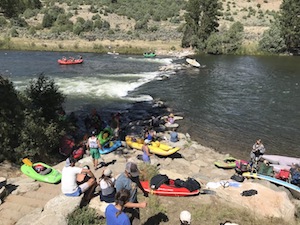Colorado River Access
 American Whitewater's Colorado River Access Program works to improve river access and public safety throughout the state by working with landowners and managers, paddlers, law enforcement, and lawmakers to understand Colorado's river access laws and the ongoing threats to public safety. Our primary goals of this program are to ensure that paddlers are able to get out of the river on private property in an emergency or in the need of a portage without being charged with trespass and to protect and establish public access areas for recreational boaters.
American Whitewater's Colorado River Access Program works to improve river access and public safety throughout the state by working with landowners and managers, paddlers, law enforcement, and lawmakers to understand Colorado's river access laws and the ongoing threats to public safety. Our primary goals of this program are to ensure that paddlers are able to get out of the river on private property in an emergency or in the need of a portage without being charged with trespass and to protect and establish public access areas for recreational boaters.
Colorado is the only state in the west that has yet to determine the extent of the public's rights to float and recreate on streams running through private property. Although the Colorado Constitution says that the rivers of the state belong to the people, a 1979 Colorado Supreme Court case and subsequent Attorney General opinion presents numerous unresolved issues. Paddlers and anglers are consistently harassed or threatened by landowners or law enforcement in areas of Colorado, and American Whitewater works diligently to find solutions to these conflicts as they arise. In recent years we have worked with the state of Colorado to clarify the trespass statutes, recreational use statutes, and limits of liability for private landowners across the state.
In 2010, American Whitewater advocated for the creation of the Governor’s River Access Dispute Resolution Task Force, which was established by Executive Order B 2010-010 on July 6, 2010. Since its creation, the purpose of the Task Force has been, “On an as-needed basis to help mediate and resolve particularly acute disputes between boater(s), either commercial or non-commercial, and the relevant private property owner(s).” The Task Force is an incredibly useful tool and has been used to solve numerous river access conflicts in Colorado. American Whitewater staff played an advisory role in the development of the Task Force and today we use it as a framework to protect the rights of boaters throughout the State.
A more recent legal development has the potential to decide the controversial debate regarding the ownership of Colorado’s riverbeds - for better or for worse. On February 2, 2018, a lawsuit (Hill vs. Warsewa 18-cv-00277) between Roger Hill, a fisherman, and Mark Warsewa and Linda Joseph, private landowners, was filed in Federal Court. However, the State of Colorado intervened with an attempt to dismiss the case from the courts and on May 29th, 2018 the fisherman dismissed his complaint “without prejudice” on his own accord. Hill then re-filed his case (Hill vs. Warsewa 18-cv-01710) in the Colorado District Court on July 6, 2018 and as of November 9, the case is still active. One of Hill’s favorite fishing spots is adjacent to the Warsewa-Joseph property on the Arkansas River downstream of Salida. Hill claims he and his close friends have been threatened multiple times, including being shot at with a firearm. Conversely, Warsewa and Joseph claim that the bed of the river adjacent to their property is their private land and that they don’t want people fishing there. The outcome of the Hill vs. Warsewa case will set a precedent for future river access disputes in Colorado and could affect our rights as boaters. American Whitewater is diligently monitoring the status of the case and will update this page as developments occur. Please see the documents listed on the right side of the page to review the legal documents that have been filed in this case.
